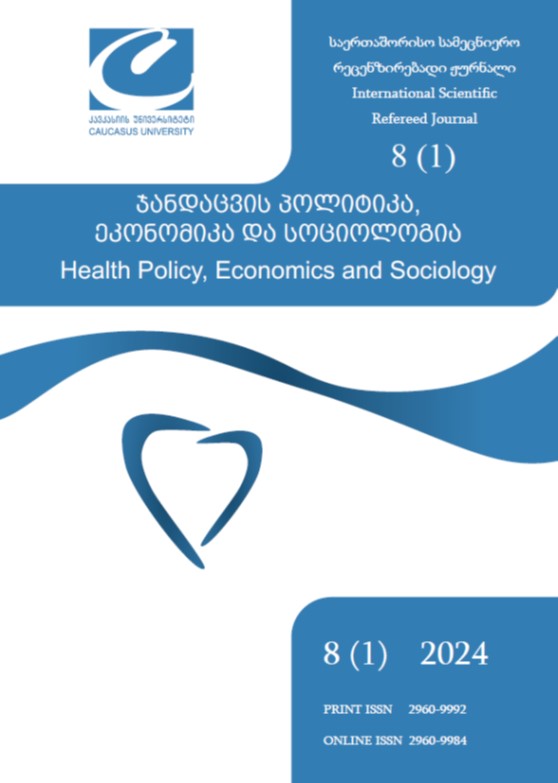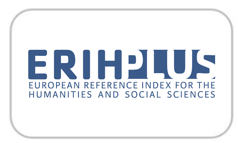სახელმწიფო ინსტიტუტების მიმართ ნდობის კრიზისის სოციოკულტურული მიდგომების ანალიზი
DOI:
https://doi.org/10.52340/healthecosoc.2024.08.01.04საკვანძო სიტყვები:
სახელმწიფო ინსტიტუტები, ნდობის კაპიტალი, სამართლებრივი სახელმწიფო, დემოკრატიზაციაანოტაცია
სახელმწიფო ინსტიტუტების მიმართ საზოგადოების ნდობის კრიზისი მნიშვნელოვანი და აქტუალური საკითხია. სტატიის მიზანია, თანამედროვე რეალობაში სახელმწიფო ინსტიტუტების მიმართ საზოგადოების ნდობის კრიზისის გამომწვევი მიზეზები შეისწავლოს. საკითხის პრობლემურობიდან გამომდინარე, სტატია მიზნად ისახავს აღნიშნულ კვლევის საკითხზე სოციალურ მეცნიერებებში სოციოკულტურული მიდგომების და თანამედროვე ავტორების თეორიების განხილვასა და ანალიზს. კვლევა ძირითადად ეყრდნობა საკითხის თეორიულ ანალიზს. შესაბამისად, განხორციელდება საკითხის თეორიული შესწავლა და გაანალიზებული იქნება კვლევის საკითხის რელევანტური ლიტერატურა, რომელიც განიხილავს მსოფლიოში არსებულ გამოცდილებას (სამართლებრივი სახელმწიფო, დემოკრატიზაციის, ტრანზიციის, კანონშემოქმედებითი პროცესის და ა.შ.). ყურადღება გამახვილდება აქტიური მოქალაქის/სამოქალაქო ჩართულობის მნიშვნელობაზე დემოკრატიული ინსტიტუტების ფორმირებაში. ანალიზი დაეყრდნობა აღწერის პროცედურას, თუმცა, ასევე გამოყენებული იქნება ინტერპრეტაციული მიდგომა.
წყაროები
ხეჩუაშვილი, ლ. (2013). პიროვნება - შესავალი პიროვნების ფსიქოლოგიაში. თბილისი
UNICEF. (2023). უნივერსიტეტის სტუდენტებს შორის ფსიქიკური ჯანმრთელობისა და სერვისებზე ხელმისაწვდომობის კვლევა. თბილისი: UNICEF.
APA. (n.d.). APA Dictionary of Psychology. Retrieved from dictionary.apa.org: https://dictionary.apa.org/mental-health-services
Bryant, J., & Welding, L. (2023, February 15). College Student Mental Health Statistics. Retrieved from bestcolleges.com: https://www.bestcolleges.com/research/college-student-mental-health-statistics/#how-many-college-students-experience-mental-health-conditions
Catalano, Brown, Lucksted, Hack, & Drapalski. (2021). Support for the social-cognitive model of internalized stigma in serious mental illness,. https://www.sciencedirect.com/science/article/pii/S0022395621000819.
CDC. (2023, აპრილი 25). mental health. Retrieved from cdc.gov: https://www.cdc.gov/mentalhealth/learn/index.htm
CSS. (2016). Socia-cognitive Learning Theory. Retrieved from dictionary.css: http://dictionary.css.ge/content/socia-cognitive-learning-theory
Darice Warren. (2023). The State of Mental Health in America 2023: Adult Prevalence and Access to Care. Retrieved from nssbehavioralhealth.com: https://www.nssbehavioralhealth.com/nss-blog-the-state-of-mental-health-in-america-2023-adult-prevalence-and-access-to-care/
Goffman, E. (2022). Stigma - Notes on the managment of spoiled identity. Penguin Classics.
Hobson. (2008). THE EFFECTS OF MENTAL HEALTH EDUCATION ON REDUCING STIGMA AND INCREASING POSITIVE ATTITUDES TOWARD SEEKING THERAPY. Humboldt State University.
Katz, J. M. (2023). Challenge case on mental health. Universitu of Pittsburgh.
Ochnik, D., Rogowska, A., & Kuśnierz, C. (2021). Mental health prevalence and predictors among university students in nine countries during the COVID-19 pandemic: a cross-national study. Nature.com.
Pfeiffer. (2022). Barriers to Seeking Psychotherapy for Mental Health Problems in Adolescents: a mixed method study. https://doi.org/10.1007/s10826-022-02364-4.
Rebecca Long, Marley Hall. (2023, თებერვალი 15). College Student Mental Health Statistics. Retrieved from bestcolleges.com: https://www.bestcolleges.com/research/college-student-mental-health-statistics/#how-many-college-students-experience-mental-health-conditions
TNC. (n.d.). Study Reveals Lack of Access as Root Cause for Mental Health Crisis in America. Retrieved from thenationalcouncil.org: https://www.thenationalcouncil.org/news/lack-of-access-root-cause-mental-health-crisis-in-america/
Warren, D. (2023). The State of Mental Health in America 2023: Adult Prevalence and Access to Care. Retrieved from nssbehavioralhealth.com/: https://www.nssbehavioralhealth.com/nss-blog-the-state-of-mental-health-in-america-2023-adult-prevalence-and-access-to-care/
WHO. (2022, ივნისი 17). Retrieved from WHO.int: https://www.who.int/news-room/fact-sheets/detail/mental-health-strengthening-our-response














